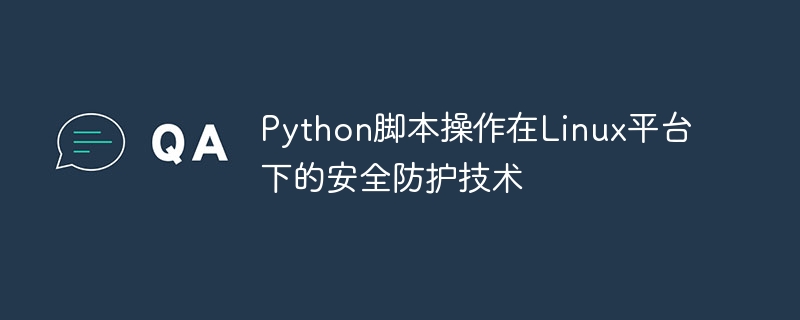

Security protection technology for Python script operations under the Linux platform
In recent years, with the frequent occurrence of network attacks, how to protect system security has become an urgent issue question. As an efficient and easy-to-use scripting language, Python plays an important role in this field. This article will introduce the security protection technology of Python scripts on the Linux platform and provide specific code examples.
For any system, password security is crucial. Using Python scripts, we can generate and store passwords. The following is a sample code:
import hashlib
def generate_password(password):
# 生成随机的salt值
salt = os.urandom(32)
# 将密码与salt值进行混合加密
hashed_password = hashlib.pbkdf2_hmac('sha256', password.encode('utf-8'), salt, 100000)
return salt + hashed_password
def validate_password(password, hashed_password):
salt = hashed_password[:32]
hashed = hashed_password[32:]
# 验证密码是否正确
return hashed == hashlib.pbkdf2_hmac('sha256', password.encode('utf-8'), salt, 100000)Through the above code, we can generate an encrypted password and store it in the database to ensure the security of the password.
Linux system security also includes preventing unauthorized remote connections. Using Python scripts, we can write a program that monitors remote connections on the system and blocks unauthorized access. Here is a sample code:
import subprocess
def block_ip(ip):
# 使用iptables阻止指定IP地址的访问
subprocess.call(['iptables', '-A', 'INPUT', '-s', ip, '-j', 'DROP'])
def unblock_ip(ip):
# 使用iptables解除对指定IP地址的阻止
subprocess.call(['iptables', '-D', 'INPUT', '-s', ip, '-j', 'DROP'])With the above code, we can block access to a specified IP address and unblock that IP address if needed.
File system security is also an important part of system security. Using Python scripts, we can encrypt, decrypt and control permissions on files. The following is a sample code:
import os
import stat
def encrypt_file(file_path):
# 对文件进行加密
subprocess.call(['gpg', '--symmetric', file_path])
def decrypt_file(file_path):
# 对文件进行解密
subprocess.call(['gpg', '--decrypt', file_path])
def set_file_permissions(file_path, mode):
# 设置文件权限
os.chmod(file_path, mode)Through the above code, we can encrypt and decrypt files, and set file permissions to ensure file security.
Through the above code examples, we can see that Python scripts implement security protection functions on the Linux platform. Of course, this is just a partial example, and actual applications may involve more complex processing. Please note that in order to ensure the security of the system, we need to handle and use these functions carefully to avoid abuse that may lead to potential security risks.
To sum up, Python scripts can effectively implement security protection under the Linux platform. Whether it is password security, remote connection or file system security, Python provides a wealth of libraries and functions to help us better protect the security of the system. Using these technologies, we can effectively improve the security of the system and reduce potential attack risks.
The above is the detailed content of Security protection technology for Python script operations on Linux platform. For more information, please follow other related articles on the PHP Chinese website!
 How to solve the problem that css cannot be loaded
How to solve the problem that css cannot be loaded
 Dogecoin price today
Dogecoin price today
 What does data encryption storage include?
What does data encryption storage include?
 403forbidden solution
403forbidden solution
 How to slow down video on Douyin
How to slow down video on Douyin
 How to use excel macros
How to use excel macros
 The role of vga interface
The role of vga interface
 How to create a bitmap index in mysql
How to create a bitmap index in mysql
 How much is Dimensity 6020 equivalent to Snapdragon?
How much is Dimensity 6020 equivalent to Snapdragon?




